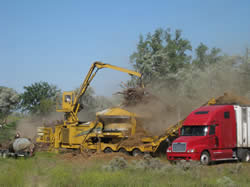
National Fire Plan Success Story
Refuge Works with Industry to Utilize Biomass
Mid-Columbia National Wildlife Refuge Complex, Oregon and Washington
National Fire Plan - Fuels Reduction
2009

Heavy equipment places biomass into a tub grinder for removal to a mill for use on Mid-Columbia National Wildlife Refuge Complex. Photo by Chris Schulte, U. S. Fish and Wildlife Service.
With the rise in natural gas costs, fire managers at the Mid-Columbia National Wildlife Refuge Complex in Washington and Oregon and the Boise Cascade Corporation have initiated a mutually beneficial agreement to remove and use accumulated vegetation. Biomass harvested at the refuges will be transported to a mill site to supplement the use of natural gas to dry paper products, thus keeping down costs for the company.
Beginning in May, contractors removed more than 185 piles of hazardous fuel, with more than 300 acres treated to date. The biomass is made up of mostly Russian olive, an invasive species, and dead cottonwood trees that create a fire hazard.
The removal of the trees and debris has both reduced the risk of fire to private property directly adjacent to the refuge and helped to enhance wildlife habitat for species looking for cover and forage. The mill site that is utilizing the biomass is less than 50 miles from the refuge sites that have been treated, additionally keeping transportation costs down.
“We are really excited about what this could mean for future projects,” said complex Fire Management Officer Chris Schulte. “Our refuge managers, biologists, and fire staff are busy identifying other opportunities to work with Boise Cascade to eliminate further biomass.”